The following summary record of remarks made by the participants of the meeting was prepared by the GPAJ staff and attributed only to the speakers whose names are identified.
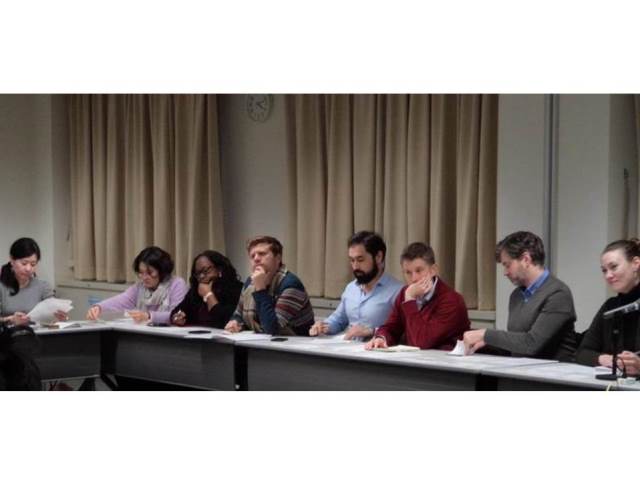
At the request of the Sasakawa Peace Foundation USA, an informal meeting was held between members of the 2019 Sasakawa USA Emerging Experts Delegation (SEED) and members of Japan International Cooperation Agency (JICA) on 6 December 2019 at JICA Office. Members of Global Peacebuilding Association of Japan (GPAJ) were also invited by JICA and joined the meeting.
US delegation members were Sefakor Ashiagbor, Senior Advisor, Political Party Programs, Chris Doten, Chief Innovation Officer, and Eunice Ha, Senior Program Manager, Asia of the National Democratic Institute (NDI); Bakhtiyor Nishanov, Regional Deputy Director for Eurasia, International Republican Institute (IRI); Paul Rothman, Project Manager, Center for International Media Assistance, and Bridget Millman, Program Officer, of the National Endowment for Democracy (NED); Jonathan Temin, Director, Africa Program, Freedom House; and Sasakawa USA staff, Kazuyo Kato, Director for Programs and Administration and Siddharth Divakaruni, Program Assistant.
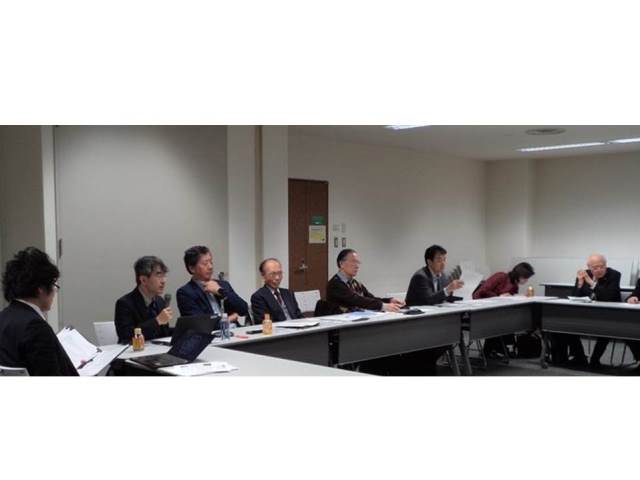
Japanese participants were from Japan International Cooperation Agency (JICA) and the Global Peacebuilding Association of Japan (GPAJ). Two senior staff from JICA were Hiroaki Shiga, Executive Senior Research Fellow, JICA Research Institute and Ken Inoue, Senior Advisor on Democratic Governance, JICA and Former Chief Governance Advisor of UNMIT. Those from GPAJ were Sukehiro Hasegawa, President of Global Peacebuilding Association of Japan (GPAJ), and Former SRSG for Timor-Leste; Masakuni Tanimoto, Secretary-General of GPAJ and Deputy Secretary-General, Japanese Parliamentary Committee for World Federalist Movement; Tadanori Inomata, Professor at Nagasaki University, Former Inspector of UN JIU, and Former Ambassador of Japan in Costa Rica; Kunio Waki, Former Deputy Executive Director of UNFPA, and Former Visiting Professor of Kwansei Gakuin University; Hideaki Shinoda, Professor, Tokyo University of International Studies and Director, Hiroshima Peacebuilders Center; Keiichi Tanabe, Associate Professor, Tokai University; Noboru Noguchi, Former UNESCO Representative to China, Mongolia and the DPR Korea and Former Director-General of the National Federation of UNESCO Associations in Japan; Yuji Suzuki, Director-General of the National Federation of UNESCO Associations in Japan and Professor Emeritus of Hosei University; Setsuko Yamazaki, Former UNDP Country Director in Cambodia and Vietnam, and Specially-appointed Professor at the Graduate School of Advanced Integrated Studies in Human Survivability, Kyoto University.
● Opening remarks by US Delegation
US delegation members offered their key findings from their weeklong study trip to Japan organized by the Sasakawa Peace Foundation USA. During the trip, the delegation met with current and former Japanese government officials, representatives of Japanese businesses, media, and civil society organizations, and university and think tank scholars. They had insightful discussions about Japanese foreign policy and overseas development assistance and how they may relate to promoting democratic institutions and values around the world. They deepened their understanding about Japanese views on its role in promoting democratic values and norms such as human rights, transparency, and accountability, and the importance of ownership and partnership in Japanese approaches to overseas development assistance. One US delegation member expressed particular interest in learning about Japanese views on the role of technology in democracy and governance and how Japan approaches the issue of disinformation, which was not a frequently covered topic during the trip. Other participants expressed their interest in learning how Japan intended to play a larger leadership role in the international community as a leading advanced industrialized democracy to promote democratic values and principles around the world. As a respected democratic country with high level of technological advancement and credibility around the world, US participants suggested that Japan could be more assertive as a mature democracy and a strong US partner to promote democratic values including political freedom and human rights in countries in Asia and Africa , even if doing so were politically challenging. . In this regard, Japanese development assistance approach could not only be inter-governmental but also engage civil society organizations. The group also expected to see Japan take a more proactive role not only in supporting economic development and education as the foundation of democracy, but also in addressing political and civil rights issues toward democratization in these countries. In their view, Japan should be more vocal and strategic in ensuring peace and security in the region. One participant noted that American democracy is not a complete success, but it is important to have conversations on the importance of promoting these universal values with likeminded countries such as Japan to share lessons-learned and best practices.
● Presentations by JICA Officials
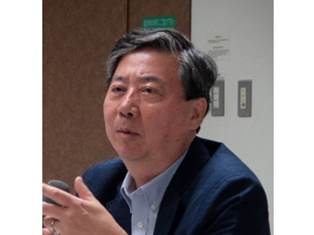 Mr. Ken INOUE identified at the outset six issues indicated in the program for discussion: diverse nature and forms of state governance; national interest and democratic values; economic development and democratic principles; safety of individuals and stability of society; Japanese and US development assistance; and bilateralism vs. multilateralism. He then focused on the 5th issue in his presentation and compared democratic governance support to developing countries between the USA and Japan based on his recent visit to Washington D.C. and meetings with various agencies including the State Department, USAID, and NED.
Mr. Ken INOUE identified at the outset six issues indicated in the program for discussion: diverse nature and forms of state governance; national interest and democratic values; economic development and democratic principles; safety of individuals and stability of society; Japanese and US development assistance; and bilateralism vs. multilateralism. He then focused on the 5th issue in his presentation and compared democratic governance support to developing countries between the USA and Japan based on his recent visit to Washington D.C. and meetings with various agencies including the State Department, USAID, and NED.
First, he found that liberty and democracy as the founding non-partisan philosophy and foundation of US governance. In Japan, universal values are stated in the constitution and the government documents, but not completely shared among all Japanese people including government and JICA officials – for them, just reciting the words is enough. Instead, they consider human relationship more important – 信頼(trust), 寄り添う(nestle close, stand close), 共に汗をかく(Sweat together). Secondly, regarding agreement with a recipient country, only a general agreement by USAID was sufficient and NGOs are just requested to respect laws. In the case of Japan, in almost always, it was required to obtain an agreement for each project. Thirdly, there are two sides of democratic governance: one side is concerned with managerial and technical matters while the other side with values and principles. Japan is interested in long-term capacity building of state institutions rather than strict adherence to the values and principles of democratic governance. Japan’s basic approach is to maintain inter-governmental relationship with any governments in spite of negligence to political and civil rights. For Japan, technical side matters as seen in the case of providing computers for Cambodia electoral support. It reflected the consideration of short-term values vs. long term capacity building. Fourthly, he explained that civil society organizations are essential partners and implementers of US development assistance advocating democracy and human rights. US subcontractors receive 25 to 30 percent in overhead costs, while Japanese NGOs get only 5 percent, not sufficient to do the work.
In conclusion, Mr. Inoue asked about the value of global governance. He stated China’s sate value is just Sino-centrism(中華思想), which cannot be the value of global governance. For the Japanese people, the most important value is harmony, i.e. to keep harmony among community members. Freedom is also important value but probably after harmony. He believes that freedom, democracy and human rights should be upheld as value/principles of global governance but also the importance of principles of human coexistence (non-violence, respect for diversity, caring & sharing, and mutual cooperation).
Regarding the low level of overhead costs, there was a comment that any prospect for raising the overhead as 5% was just too low for the need to invest in staff and strengthen their competency. Mr. Inoue mentioned that an increase in overhead costs was examined and likely to be realized in Japan.
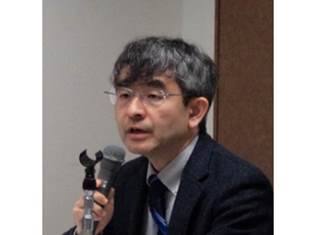 Mr. Hiroaki SHIGA explained that Japanese officials wish to maintain the coherence in government policy and implementation. He noted that human rights, democratic principles and the rule of law are clearly stated in the Development Cooperation Charter of 2015 that JICA adheres, although JICA has not provided support actively under the explicit name of “democracy promotion”. Mr. Shiga argued that it resulted from a deeply entrenched belief among Government and JICA officials that “development aid shall be, and can be, apolitical (non-political) activity.” Many believed that aid practitioners should take proper distance from the domestic politics of recipient countries, and donors should respect their ownership. It had historical roots. Japan invaded China and Southeast Asian countries. After the War, Japan experienced great difficulties in establishing amicable relationship with Asian countries and in re-entering the Asian market. So, it was necessary to impress them that Japan would never want to interact with Asia for political purpose and named “development aid” as “economic cooperation”. It was not “aid” but “cooperation” on the basis of “non-interference on domestic affairs” and “mutual benefits”. It turned out to be a good strategy to keep amicable relationship with autocratic Asian leaders such as Suharto, Marcos and Mahathir. But sign of change can be observed in JICA. Young generation staff doesn’t have psychological resistance to political ODA, and many of them are committed to “political aid” as it is important to advocate universal human rights in development cooperation. such as democracy promotion.
Mr. Hiroaki SHIGA explained that Japanese officials wish to maintain the coherence in government policy and implementation. He noted that human rights, democratic principles and the rule of law are clearly stated in the Development Cooperation Charter of 2015 that JICA adheres, although JICA has not provided support actively under the explicit name of “democracy promotion”. Mr. Shiga argued that it resulted from a deeply entrenched belief among Government and JICA officials that “development aid shall be, and can be, apolitical (non-political) activity.” Many believed that aid practitioners should take proper distance from the domestic politics of recipient countries, and donors should respect their ownership. It had historical roots. Japan invaded China and Southeast Asian countries. After the War, Japan experienced great difficulties in establishing amicable relationship with Asian countries and in re-entering the Asian market. So, it was necessary to impress them that Japan would never want to interact with Asia for political purpose and named “development aid” as “economic cooperation”. It was not “aid” but “cooperation” on the basis of “non-interference on domestic affairs” and “mutual benefits”. It turned out to be a good strategy to keep amicable relationship with autocratic Asian leaders such as Suharto, Marcos and Mahathir. But sign of change can be observed in JICA. Young generation staff doesn’t have psychological resistance to political ODA, and many of them are committed to “political aid” as it is important to advocate universal human rights in development cooperation. such as democracy promotion.
● Exchange of Views and Opinions
1. Purpose of Development Aid
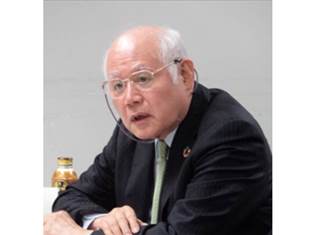 Ambassador Tadanori INOMATA said that none of the policy goals such as “Democratization” and “Human Security” are explicitly accepted in the UN system as minimum standards common to all nations. They do not figure as such in SDGs while the latter spell out universal goals in three dimensions of sustainable development, i.e. economic growth, social equity and environmental protection. Each country has its own path to integrate and balance these dimensions in accordance with its proper national decision-making process to “(e)nsure responsive, inclusive, participatory and representative decision-making at all levels” (SDG16.7). Enabling conditions for “Democratization” and “Human Security” in developing countries reside in collegial partnership with these countries to ensure evidence-based integration of the three dimensions and inclusive governance and decision-making on SDGs for all rather than advocating legalistic adherence to human rights and democracy. Many members of the GPAJ are inclined to support Antonio Guterres’ vision for SDG-based conflict prevention to address root causes of conflict including inequalities among and within countries.
Ambassador Tadanori INOMATA said that none of the policy goals such as “Democratization” and “Human Security” are explicitly accepted in the UN system as minimum standards common to all nations. They do not figure as such in SDGs while the latter spell out universal goals in three dimensions of sustainable development, i.e. economic growth, social equity and environmental protection. Each country has its own path to integrate and balance these dimensions in accordance with its proper national decision-making process to “(e)nsure responsive, inclusive, participatory and representative decision-making at all levels” (SDG16.7). Enabling conditions for “Democratization” and “Human Security” in developing countries reside in collegial partnership with these countries to ensure evidence-based integration of the three dimensions and inclusive governance and decision-making on SDGs for all rather than advocating legalistic adherence to human rights and democracy. Many members of the GPAJ are inclined to support Antonio Guterres’ vision for SDG-based conflict prevention to address root causes of conflict including inequalities among and within countries.
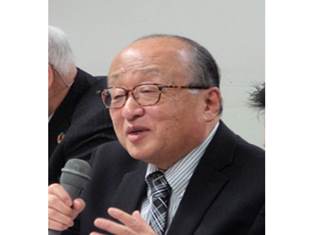 Mr. Kunio WAKI noted that some had referred to democracy as given by the United States occupation forces after the World War II. They also said human rights did not exist one hundred fifty years ago and women did not have any rights. Some Japanese intellectuals even had suggested that the Japanese still suffered from the mentality of colonized people. This was the main reason why Japan had not had any vision and strategy in foreign policy and foreign aid, causing the Japanese to act arbitrarily. His views on Japan`s relationship with the US and the situation on DPRK may differ from the standard understandings of most Japanese as he worked overseas a long time and visited DPRK twice as UNICEF Representative. The US should understand the Japanese mentality and try to help Japan.
Mr. Kunio WAKI noted that some had referred to democracy as given by the United States occupation forces after the World War II. They also said human rights did not exist one hundred fifty years ago and women did not have any rights. Some Japanese intellectuals even had suggested that the Japanese still suffered from the mentality of colonized people. This was the main reason why Japan had not had any vision and strategy in foreign policy and foreign aid, causing the Japanese to act arbitrarily. His views on Japan`s relationship with the US and the situation on DPRK may differ from the standard understandings of most Japanese as he worked overseas a long time and visited DPRK twice as UNICEF Representative. The US should understand the Japanese mentality and try to help Japan.
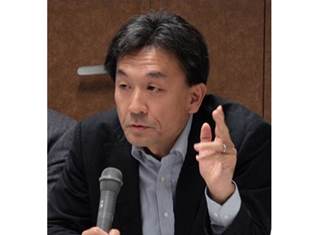 Professor Hideaki SHINODA explained that Japan had kept a low profile, although the Japanese are aware of the desirability of advocating universal human rights and other values. The Japanese enjoy living in a democratic society but feel that Japanese democracy is not a perfect one with one party, the Liberal Democratic Party, dominates the Diet and the Government. The Japanese want to overcome their historical quagmire as they have been hunted by the legacy of World War II. Japan continue to depend on the US umbrella and work in partnership as Japan has no regional mechanism.
Professor Hideaki SHINODA explained that Japan had kept a low profile, although the Japanese are aware of the desirability of advocating universal human rights and other values. The Japanese enjoy living in a democratic society but feel that Japanese democracy is not a perfect one with one party, the Liberal Democratic Party, dominates the Diet and the Government. The Japanese want to overcome their historical quagmire as they have been hunted by the legacy of World War II. Japan continue to depend on the US umbrella and work in partnership as Japan has no regional mechanism.
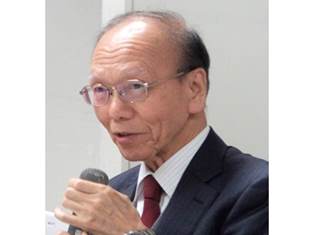 Mr. Noboru NOGUCHI focused on the importance of multilateralism in international cooperation. However, he found multilateralism was at stake for the attitude of the US Government which had withdrawn from UNESCO. He wondered if and how the United States could return to its position of its world leadership. It was informed that American non-governmental organizations were active in promulgating the SDGs, and the United States encourages local governments as well as NGOs play a bigger role in development of their countries. US policy advocacy organizations are partnering with their counterparts in Ukraine, Malaysia, Ethiopia for fostering democratic governance. The partners do consider human rights should not be neglected in favor of economic growth. Without democratic principles and rule of law, economic and social development would not be sustainable, and the SDG goals could not be attained.
Mr. Noboru NOGUCHI focused on the importance of multilateralism in international cooperation. However, he found multilateralism was at stake for the attitude of the US Government which had withdrawn from UNESCO. He wondered if and how the United States could return to its position of its world leadership. It was informed that American non-governmental organizations were active in promulgating the SDGs, and the United States encourages local governments as well as NGOs play a bigger role in development of their countries. US policy advocacy organizations are partnering with their counterparts in Ukraine, Malaysia, Ethiopia for fostering democratic governance. The partners do consider human rights should not be neglected in favor of economic growth. Without democratic principles and rule of law, economic and social development would not be sustainable, and the SDG goals could not be attained.
Ambassador Inomata stated that even authoritarian countries have to adjust to market forces. Especially the impact of consumers avoiding products and divesting from autocratic economies cannot be underestimated when companies of these countries violate human rights and/or deviate from global environmental standards. Reaction of investors and consumers would be signal to these countries enough to correct autocratic policy.
In a subsequent exchange of views, one participant suggested that we should not make it an issue of one or another, i.e. economic development or human rights, and try to do both. Noting that Japan is an advanced democratic country, the Japanese aid policy makers and implementers should not neglect the importance of advocating democratic principles just because economic growth was favored by authoritarian governments. He reiterated that democratic principles were essential for sustainable development by saying that a house on sand could not be sustained.
With regard to the commitment of the United States to multilateralism and SDGs, it was pointed out that the United State was in fact the largest contributor to almost all multilateral organizations including the United Nations and the World Bank and provided the largest amount of aid resources to these multilateral organizations in support of SDGs. It was further explained that the US follows a two-rack approach to achieving sustainable development, climate change, human security, etc. Referring to the second track or bilateral assistance, the US was also the largest aid donor consistently for many years. The aid resources represent only one percent of the total budget of the US Federal Government (Note by editor: About $41 billion out of $4.1 trillion US expenditures in 2019. ODA grant equivalent as percent of GNI in 2018 was 0.17% for USA, 0.28% for Japan while the average for DAC countries was 0.31% of GNI in 2018).
Responding to a question about the difference between policy announcement and implementation, one participant pointed to the power distribution in the U.S. system between executive and legislative branches of the US Government, which has allowed the U.S. Congress to secure the necessary federal budget for democracy promotion. The US government and aid organizations are spending a substantial amount of resource for peace, justice and rule of law that were included in SDG 16. They also place a priority on gender equality, SDG 5.
2. Role of Civil Society Organizations
The participants then discussed the role of civil society organizations. Mr. Inoue found US civil society organizations are well funded and engaged in advocating civil rights, while the Japanese NGOs have concentrated in education, health and other technical areas. It was pointed out that there were many sources for fund raising by American NGOs and wondered if Japanese NGOs could explore getting funds from private foundations and other sources instead of the Ministry of Foreign Affairs and JICA. The Japanese NGOs could also work in partnership with foundations and institutions of other countries. Concerning how democracy started, it was stated that democratization process had been started as long as 150 years ago when young Japanese leaders were sent to Europe and the United States to learn about political philosophies, institutions and democratic process. Mr. Hasegawa added that through the Meiji Revolution, Japan had acquired the democratic form of governing the nation as a centralized state, but fragile democracy was overrun by nationalists and military leaders who wanted to make Japan strong, prosperous, and powerful. He then noted the need to prevent any recurrence of a similar development in any country including Japan and the United States.
In response, Mr. Shiga added that Mr. Hasegawa’s comment reminded him of Steven Levitsky and Daniel Ziblatt’s analysis of how democracies die as authoritarian leaders of many countries engaged in abusing democratic ways of governance in post-Cold War. They revealed that what matters was not the existence of the formal constitutional mechanism of checks and balances but the ability of politicians and people to safeguard the norms and values of democratic governance. For any aid organizations such as JICA and USAID, there is a need not only to help strengthen the institutional system but imbue the norms and principles of democracy and human rights to national leaders and people.
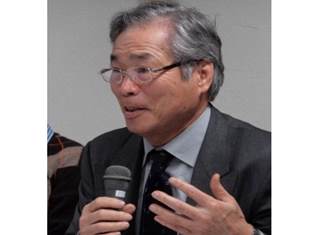 Noting his expertise as a specialist in Southeast Asian politics, Professor Yuji Suzuki referred to what Levitsky said in his book, Competitive Authoritarianism, and explained how democratic process resulted in emergence of autocratic leaders. Professor Suzuki explained that, following the encouragement of Japan, US and European countries, many Southeast Asian countries went through the democratic process which resulted in the emergence of states that are democratic in appearance but authoritarian in nature.Some leaders have succeeded in submitting first to multiparty democratic processes and then to engage in serious abuse of power by establishing autocratic rule. He cited as an example of the outcome of procedural democracy, Mahathir who ruled Malaysia as an autocratic ruler for decades, over the façade of democracy. He then referred to Indonesia where the process of deeper democratization was encouraged at local level with involvement of civic community organizations. In the 1990’s JICA tried to help the process of decentralized democracy at the local grassroot level. In conclusion, Professor Suzuki advocated strengthening of the capability of local and municipal government to maintain rule of law and human rights through deeper institutionalization of decentralized democracy at local level. As an example, he referred to the cases of Indonesia, Japan and the United States where the localization of the decentralized democratic practices keep the grassroot communities safeguard human rights and civil society.
Noting his expertise as a specialist in Southeast Asian politics, Professor Yuji Suzuki referred to what Levitsky said in his book, Competitive Authoritarianism, and explained how democratic process resulted in emergence of autocratic leaders. Professor Suzuki explained that, following the encouragement of Japan, US and European countries, many Southeast Asian countries went through the democratic process which resulted in the emergence of states that are democratic in appearance but authoritarian in nature.Some leaders have succeeded in submitting first to multiparty democratic processes and then to engage in serious abuse of power by establishing autocratic rule. He cited as an example of the outcome of procedural democracy, Mahathir who ruled Malaysia as an autocratic ruler for decades, over the façade of democracy. He then referred to Indonesia where the process of deeper democratization was encouraged at local level with involvement of civic community organizations. In the 1990’s JICA tried to help the process of decentralized democracy at the local grassroot level. In conclusion, Professor Suzuki advocated strengthening of the capability of local and municipal government to maintain rule of law and human rights through deeper institutionalization of decentralized democracy at local level. As an example, he referred to the cases of Indonesia, Japan and the United States where the localization of the decentralized democratic practices keep the grassroot communities safeguard human rights and civil society.
Mr. Inoue stated that Japan had strong civil society organizations, but they were engaged in social and welfare issues and very few are involved in advocating political and civil rights. For the Japanese, harmony and not freedom is the number one concern as they regard most important for communities to maintain harmony rather than individual human rights and freedom.
Concerning democratization process, Mr. Waki suggested that the conditions at various countries should be looked at in terms of stages of their political development. In Asia they are more advanced in Japan and South Korea, but less so in Malaysia and Indonesia. In Africa, many governments had been inefficient and corrupt under authoritarian rule, but they have come a long way. Women are now visible in playing their role. In his view, decentralization takes place when central governments are incompetent. In Japan, local governments play a major role in advancing social welfare of people and civil society organizations are active although they are still weak. Concerning Japan, he explained that the Abe Government tends to follow too closely the United State Government. The Diet of Japan has become weak with the dominance of the Liberal Democratic Party while the judiciary institutions are docile. In conclusion, Mr. Waki suggested that the balance of power among executive, legislative and judicial institutions should be fostered. In promoting democracy, US should be more understanding and sympathetic of local conditions at different stages of development.
Ambassador Inomata warned against under-estimating the fact that most of the Japanese civil society activities are undertaken by local communities’ volunteers under the framework coordinated by Local Government Organizations . There is already a sizeable amount of experience and professional know-how accumulated as well as social services and systems established for life saving and recovery and reconstruction at local municipality and community levels since the 1995 Hanshin-Awaji earthquake disaster and the 2011 subsequent Tohoku earthquake and tsunami disasters, etc. Japan’s civil societies acquired resilience to hazards and are no less robust than CSOs in other countries. Solidarity, trust in police and local authority bind Japanese communities together. Strong community solidarity exists in Japan.
● Concluding Remarks
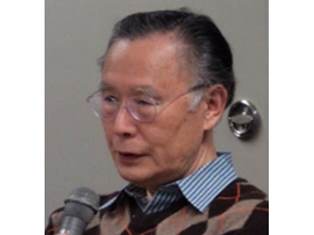 In concluding the discussion, Professor Hasegawa referred first the prudent approach advocated by one of the American participants who advised not to insist on one approach and disregard others but to find merits of adopting an approach that combine the merits of all perspectives. He then noted three points. First, referring to Mr. Noguchi’s observation, he called upon the US delegation to recognize the inherent merit of pursuing the multilateral approach in global governance to ensure transparency and accountability, referring to John Rawls’ theory of justice. Second, he noted Ambassador Inomata’s suggestion to recognize the Sustainable Development Goals (SDGs) as a frame of reference for an indicator of progress as SDGs had been adopted by the United Nations. Thirdly, he explained that Japan had rightly endeavored to gain a “honorable place” in the international community as promulgated in the Constitution by not resorting to force in the resolution of international disputes.
In concluding the discussion, Professor Hasegawa referred first the prudent approach advocated by one of the American participants who advised not to insist on one approach and disregard others but to find merits of adopting an approach that combine the merits of all perspectives. He then noted three points. First, referring to Mr. Noguchi’s observation, he called upon the US delegation to recognize the inherent merit of pursuing the multilateral approach in global governance to ensure transparency and accountability, referring to John Rawls’ theory of justice. Second, he noted Ambassador Inomata’s suggestion to recognize the Sustainable Development Goals (SDGs) as a frame of reference for an indicator of progress as SDGs had been adopted by the United Nations. Thirdly, he explained that Japan had rightly endeavored to gain a “honorable place” in the international community as promulgated in the Constitution by not resorting to force in the resolution of international disputes.




